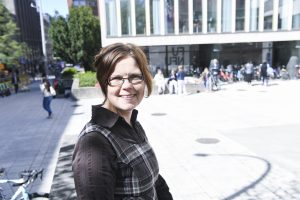
In today’s post, the Finnish China Law Center is pleased to introduce the research project ‘The Rise of China and Normative Transformation in the Arctic Region’ led by Dr. Sanna Kopra, Academy of Finland post-doctoral researcher in the Arctic Centre at the University of Lapland, visiting scholar in Aleksanteri Institute at the University of Helsinki, and Senior Fellow at the Arctic Institute.
The project was awarded €237,970.00 by the Academy of Finland, and is hosted by the Arctic Centre, University of Lapland, one of the member institutions of the Finnish China Law Center.
The research not only addresses China’s interests and activities in the Arctic, but also investigates the normative transformation those activities may support or initiate in the Arctic region. The project asks, with China’s growing role in the area, what kind of impacts it could have in the normative framework in the Arctic, what kind of norms China wants to promote or not to promote in the regional, and how the existing governance framework, particularly the Arctic Council, has addressed China’s involvement in the region. The project’s key concept is the notion of responsibility. Thus, it also examines China’s notion of responsibility in the Arctic, whether it is deferred from the one formulated by other Arctic players, especially the 8 Arctic states, and whether there is some normative discourse or differentiation between the non-Arctic states and Arctic states, etc.
Regarding research methodology, Dr. Kopra mainly uses content analysis and discourse analysis. Having a strong interest in history, she aims to combine also the historical approach to shed light on the historical evolution of the normative framework and notion of responsibility in the Arctic.
As part of the project, Dr. Kopra spent two months on a research exchange at the University of Tromsø in Norway during 2019. ‘It was a good academic exchange. It helped me develop new ideas, receive helpful feedback, and get new information and data’, she said. She plans to conduct a research visit to Iceland next spring.
Publication:
- Timo Koivurova and Sanna Kopra (eds) (2020) Chinese Policy and Presence in the Arctic. Brill Nijhoff, Leiden
- Sanna Kopra (2019) China in the Polar “Zone of Peace”. Echowall 15 Nov 2019
- Sanna Kopra (2019) Responsibility for climate justice: the role of great powers. In: Paul G. Harris (ed) A Research Agenda for Climate Justice. Edward Elgar, Cheltenham
- Sanna Kopra (2019) Will the Ice Silk Road become the compass for the Arctic? Aleksanteri Insight 4
- Sanna Kopra (2019) China, Great Power Responsibility and Arctic Security. In: Lassi Heininen, Heather Exner-Pirot (eds) Climate Change and Arctic Security: Searching for a Paradigm Shift. Palgrave Pivot, Cham
- Sanna Kopra (2019) The Dragon looks to the North: China’s growing role in the Arctic. Atlantic Community 4 Jul 2019
- Sanna Kopra (2019) China and great power responsibility for climate change. Routledge: London
- Sanna Kopra (2019) 北欧对国际气候政治的贡献. In: Lassi Heininen, Jian Yang (eds) 北极合作的北欧路径: Objectives and Approaches. Current Affairs Publishing House: Beijing
- Sanna Kopra & Karoliina Hurri (2018) Puolan ilmastokokouksessa paljon pöydällä: Odottaako maailma Kiinalta liikaa? The Ulkopolist 5 Dec 2018
- Liisa Kauppila & Sanna Kopra (2018) Pohjoinen on punainen? : Kiina ja Arktiksen uusi alueellistuminen. KOSMOPOLIS 48(3): 22-39
- Sanna Kopra (2018) With Great Power Comes Great Climate Responsibility. E-International Relations 12 Oct 2018
- Sanna Kopra (2018) Climate change and China’s rise to great power status: implications for the Global Arctic. In: Matthias Finger, Lassi Heininen (eds) The Global Arctic Handbook. Springer, Cham
- Sanna Kopra (2018) China and the UN Climate Regime: Climate Responsibility from an English School Perspective. Journal of International Organizations Studies 9(2): 59-74
- Sanna Kopra (2018) China, Great Power Management, and Climate Change: Negotiating Great Power Climate Responsibility in the UN. In: Tonny Brems Knudsen, Cornelia Navari (eds) International Organization in the Anarchical Society: The Institutional Structure of World Order. Palgrave Macmillan, Cham
- Sanna Kopra (2018) Lead the Way: China and international climate politics. Baltic Transport Journal 5: 58-59
